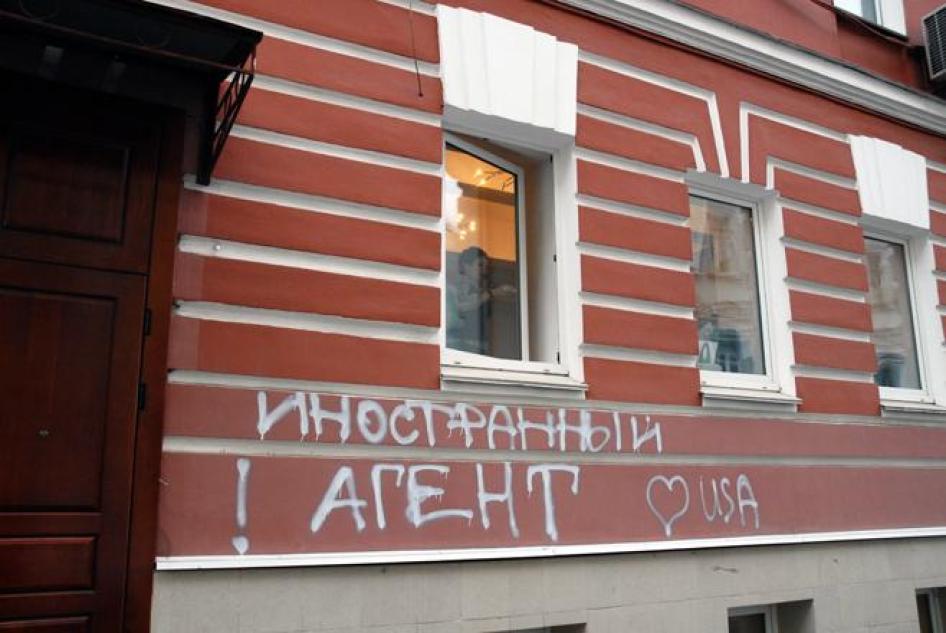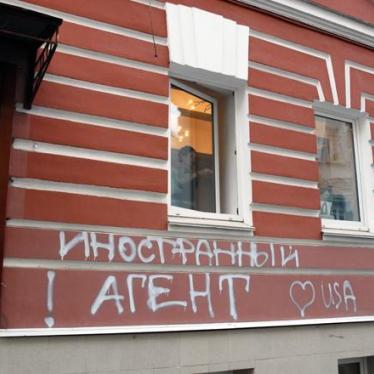By stigmatizing independent civil society, media and other dissenting voices as “trojan horses”, “foreign agent” laws have offered a convenient framing to delegitimize and isolate them. In addition, they have also helped to impose harsh monitoring and reporting requirements and shut critics out of public life. As the promotion of democratic practices and human rights threatens authoritarians’ grip on power, “foreign agent” laws offer a handy tool to discredit these activities by equating them with promoting the interests of a foreign power.
It has not helped that democracies, including the European Union, have entertained foreign influence style legislation as part of ill-conceived attempts to counter foreign interference. While in the case of the EU, an effort is being made to narrow down the scope of application and build in safeguards to protect civil society, such laws carry the risk of a chilling effect and authoritarian governments cynically use them to justify their abusive legislation.
Targets of foreign agent laws
Foreign agent laws vary but they have a few elements in common. Chief among them is the requirement for groups receiving foreign funds and carrying out broadly defined “political activity” to register as “foreign agents”, “foreign representatives”, or “organizations serving the interests of a foreign power”. The publications, communications and other materials of these groups are then labelled accordingly. Such designations have come with further harsh restrictions on activity, intrusive government meddling, and the monitoring of such groups’ work. There have also been excessive reporting requirements, penalties for alleged non-compliance, and the outright closure of organizations.
The notion of “political activity” in these laws can involve anything from advocacy, research, legal or policy analysis, and other activities aimed at influencing public policy, to organizing public debates, events, rallies and demonstrations. Other activities include conducting or participating in election monitoring; carrying out public opinion surveys; disseminating legal or expert opinions; monitoring the work of government institutions; and a whole host of legitimate civil society activities.
The primary target of these laws are civil society and media organizations – not for-profit lobbying groups or other commercial organizations engaged in the same type of activities. The laws apply regardless of whether foreign donations come from state or non-state sources, or whether the groups carry out activities on behalf of the foreign donor. Foreign agent laws have been found to violate freedom of association and to discriminate against non-profit groups and media by various international bodies such as the UN Human Rights Committee, the European Court of Human Rights, the Office for Democratic Institutions and Human Rights (ODIHR) of the Organization for Security and Co-operation in Europe (OSCE), and the Venice Commission of the Council of Europe.
The UN special rapporteur on the rights to freedom of peaceful assembly and of association has repeatedly emphasized that the ability to seek and receive resources from both domestic and foreign sources is an integral and vital part of the right to freedom of association, including under the International Covenant on Civil and Political Rights (ICCPR).
Russian origins
The archetypal foreign agent law is Russia’s 2012 legislation on regulating the activities of non-commercial organizations performing the function of “foreign agents” (“law on foreign agents”). Adopted just months after Vladimir Putin’s return as president of Russia in the wake of large-scale protests against his rule, the law was a foundation for the Kremlin’s entrenching authoritarianism and a precursor to the wide-scale repression to come.
It has resulted in the closure or decimation of the activity of a wide swathe of groups, including prominent human rights organizations; anti-corruption, environmental and polling groups; service providers working on issues such as HIV prevention and diabetes care; media organizations; and others. Many organizations have closed down on their own, citing stigmatizing labelling, a lack of resources to cope with overwhelming reporting requirements, and a lack of funds to pay the fines.
Successive amendments have expanded the scope of the law to the point that it could now apply to almost anyone. As of Russia’s full-scale invasion of Ukraine in 2022, authorities no longer need to prove any foreign funding as the legislation was drastically extended to include any individual or organization deemed to be under vaguely defined “foreign influence”. Amendments also exclude alleged “foreign agents” from many aspects of public life, such as the civil service, elected office, teaching children, etc. Penalties range from hefty fines to up to five years in prison.
Russian authorities also included opposition to the war and support of Ukraine to justify numerous “foreign agent” designations. In the first two years after the full-scale invasion of Ukraine, the list of foreign agents more than doubled, from 336 to over 700 at the end of 2023. In 2022, the European Court of Human Rights ruled that Russia’s law violates the right to freedom of assembly and association but Russia – by then no longer a member of the Council of Europe – ignored the ruling.
In Russia, but also elsewhere, “foreign agent” laws appeared in the context of a vibrant public sphere as a method to advance autocracy. Hardened authoritarian states – the likes of Turkmenistan – where no civil society was ever allowed to develop from the moment the Soviet Union broke up – hardly need a “foreign agent” law. The experience of what followed Russia’s adoption of the law on “foreign agents” does not bode well for what is to come in countries that have recently passed similar legislation, such as Georgia and Kyrgyzstan.
Punishing critics
On May 14th this year the Georgian parliament passed a “foreign agent” style law that requires any civil society and media organizations receiving 20 per cent or more of their funding from a foreign source to register as organizations “serving the interests of a foreign power”. An almost identical bill had been withdrawn a year ago in the face of massive protests. Ahead of crucial parliamentary elections this October, the authorities are out to discredit and dismantle Georgia’s vibrant civil society and independent media. These are the last vestiges of free expression and independent scrutiny that can challenge the government’s policies and conduct.
Authorities in Georgia claim the law promotes transparency – a typical and convenient excuse for “foreign agent” laws. However, their rhetoric has made clear that it will be used to stigmatize and punish critical voices. This has been confirmed by a campaign of violent intimidation and smear tactics against civil society and political activists that was under way even before the law’s final adoption. Civil society organizations have noted that only certain types of organizations are singled out in the law – excluding for example businesses or non-governmental groups receiving government funding – as a clear indication that the goal is not transparency, but to silence critical groups that speak out against government abuses.
Earlier in the year, on April 2nd, President Sadyr Japarov signed Kyrgyzstan’s abusive “foreign representatives” law, matching the Russian prototype even closer than Georgia. The law applies the stigmatizing designation of “foreign representative” to any non-governmental organization receiving any amount of foreign funding and engaging in vaguely defined “political activity”. The bill had been widely criticized after its initial submission in November 2022.
Many organizations self-liquidated or ceased activities on the territory of the country, including LGBTQ+ and youth groups, already before the deadline to volunteer to be included in the “foreign representatives” registry. The full impact of the law on Central Asia’s most vibrant civil society is yet to be seen.
Many shades of repression
“Foreign agent” laws are not the only method to shrink the civic space. Governments can crack down on civil society through other types of repressive legislation. These can include laws with excessive, burdensome registration and operating requirements, as well as those that require the registration and government approval of grants, excessive reporting, and intrusive government monitoring with criminal sanctions for non-compliance. Azerbaijan has virtually closed the space for independent activism and journalism through such means.
Foreign agent laws add on top of these restrictions a stigmatizing label that allows governments to present the crackdown through a narrative that has a greater chance of certain public acceptability than that of blunt government control over civic activity. There is an added benefit of delegitimizing the causes that many of these organizations work for – civil and political rights, equality and anti-discrimination – as the agendas of foreign powers rather than universal values.
Even in the much more robust EU regulatory and justice context, “foreign agent” or foreign influence style laws have been making their way to EU countries. Hungary’s 2017 NGO Transparency Law is a classic example that targeted exclusively non-profit organizations receiving foreign funds and engaging in almost any type of activity. Affected groups had to identify themselves in all published and online material as “foreign funded organizations”.
The law was repealed in 2021 after the EU Court of Justice ruled in a landmark case that it violates EU law, including the EU Charter of Fundamental Rights. The Court identified the right to access funding as a substantive element of freedom of association and recognized the chilling effect of such laws, which can foster a climate of distrust in the work of associations.
Yet, the government of Viktor Orbán did not give up in its effort to stifle independent groups. In December 2023 Hungary’s parliament approved a new Law on the Protection of National Sovereignty that gives a government-controlled body broad powers to target civil society and independent media. The law's vague definitions of "foreign interests" and "national sovereignty", combined with the unchecked power of its enforcement arm to access government and intelligence data alongside conducting unchallengeable smear campaigns, have fostered a climate of fear and self-censorship in Hungary. Even though the European Commission has opened an infringement procedure against Budapest over the law, the government has already used it to target the anti-corruption organization Transparency International Hungary and a local anti-corruption investigative media group.
Other European politicians close to the Kremlin have also drawn inspiration from the Russian laws. Under intense local and international pressure, the authorities in the Republika Srpska entity of the EU candidate country Bosnia and Herzegovina in May 2024 withdrew a foreign agent law strongly modelled on the Russian example. It included vague definitions of foreign “support” for almost any type of activity that would trigger the designation of a non-profit group as an “agent of foreign influence”. In Bulgaria, the pro-Kremlin far right has unsuccessfully attempted to push a “foreign agent” law since 2022.
Unintended consequences
In the case of foreign agent laws in Russia, Kyrgyzstan and Georgia, as well as the 2017 Hungarian law or the recently withdrawn law in Bosnia, ambiguity and the overly broad scope of definitions appear intended to permit arbitrary interpretations of the law. This allows the government to target inconvenient groups and critics, and create legal uncertainty and a chilling effect, leading to self-censorship, the stifling of work and even the closure of such organizations.
However, even legislation with no punitive aims towards civil society can bring unintended consequences if it unduly discriminates between groups. This is the case with narrower foreign interest representation laws that limit registration and other requirements to groups acting on behalf of foreign principals. For one, authoritarians have hypocritically cited these laws to justify their purely repressive legislation.
The Kremlin and others customarily speak of reciprocating the US Foreign Agent Registration Act (FARA), even though it applies only to organizations and individuals that operate under the direction and control of a foreign principal. It also does not equate receiving foreign funding with being under the direction and control of a foreign entity.
However, even such narrower foreign influence laws can have damaging consequences by stigmatizing the work of legitimate civil society representatives. France has recently passed a law on foreign interference, including various online surveillance measures and a registry for groups carrying out foreign interest representation, that has been criticized by civil society. Likewise, a December 2023 proposal by the European Commission for a new “Directive on Transparency of Interest Representation on behalf of Third Countries” sent shockwaves through European civil society with the proposal to create a register of foreign-funded organisations.
The EU Directive built in safeguards such as limiting its scope only to interest representation services carried out on behalf of foreign states, rather than simply the receipt of foreign funds from any source – a provision that distinguishes it from typical “foreign agent” laws. Yet, an overwhelming number of civil society groups and many EU member states have expressed serious concern over the risk of stigmatizing civil society and the potential for the law to be perceived as similar to “foreign agent” legislation.
The Georgian ruling party and authorities in Bosnia’s Republika Srpska referred to the EU Directive to justify their own abusive legislation. To avoid stigmatization and misperceptions, many EU states and civil society organizations have argued for a lobbying or transparency register, covering all actors engaged in influence on decision-makers, not one that singles out “foreign” interest representation.
Tracking the influence of money in politics has a legitimate aim in promoting democracy. But that makes it all the more important for governments that are using influence tracking measures to promote a healthy democracy to make sure those measures do not discriminate against certain groups. They have to be absolutely necessary, proportionate, narrowly drawn, and monitored by an independent body to identify any pernicious impact.
Many governments have created legal constraints on non-governmental groups recently that, intentionally or not, may constrain their activities or silence them. We can only hope that the EU will establish a solid standard that fosters free expression and civic space at home and helps to counter malign stigmatization and curbs on civil society abroad.
The author would like to thank Hugh Williamson, Rachel Denber, Ben Ward, Tanya Lokshina, Giorgi Gogia, Syinat Sultanalieva, Lydia Gall, Elida Vikic and Aisling Reidy for their contributions to this article.









